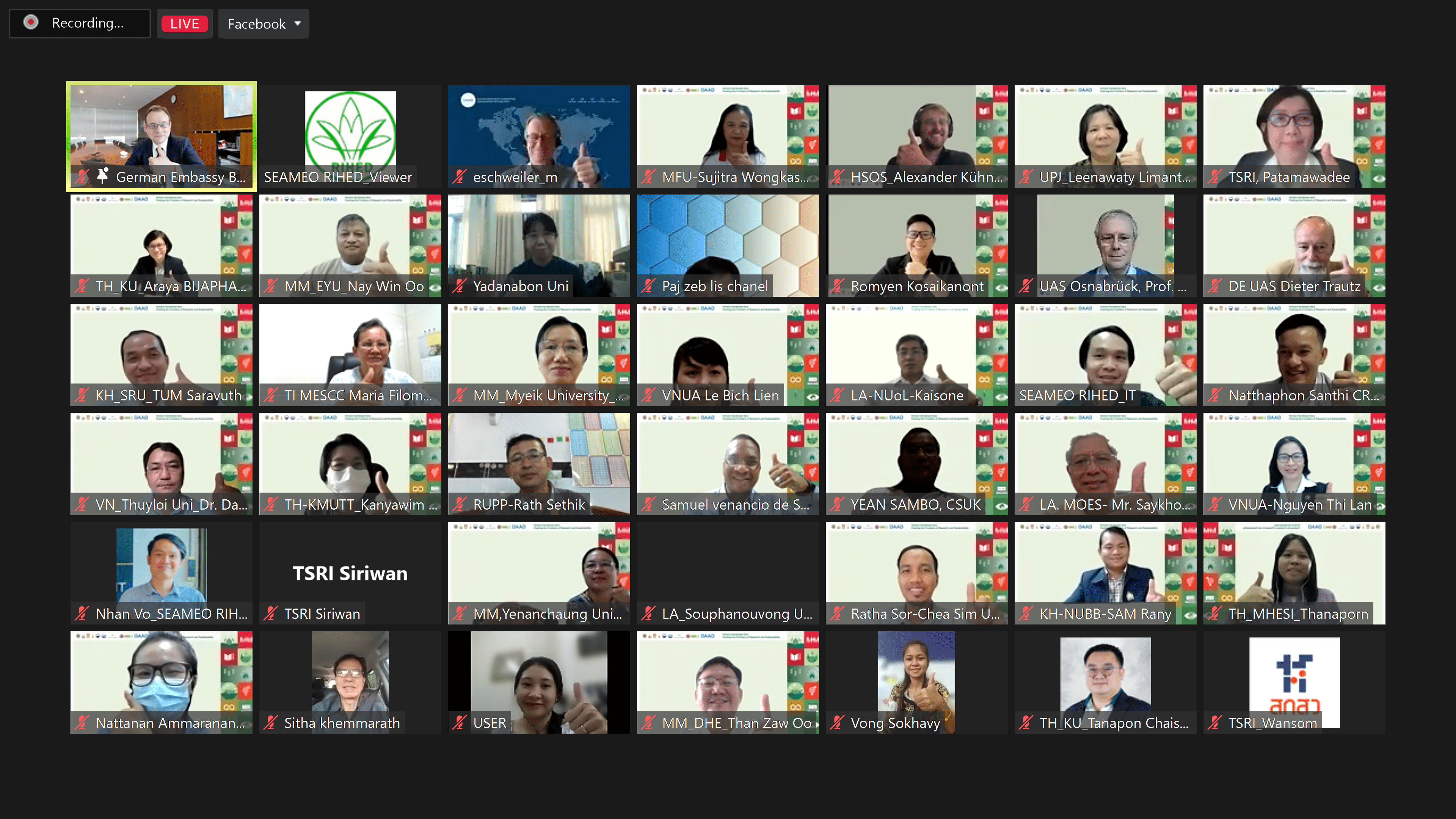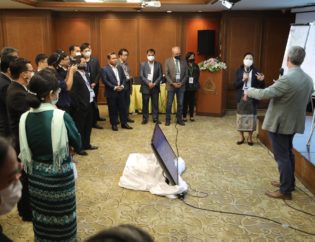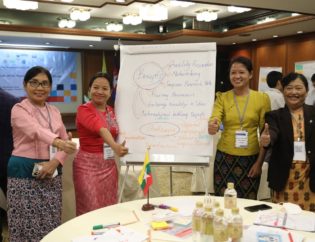

Press Release
The First Milestone towards More Sustainable Research Ecosystems in the Greater Mekong Subregion and Timor Leste
SEAMEO RIHED and the DAAD held the official Launch and Leadership Forum of the Project ‘Horizon Southeast Asia: Pushing the Frontiers of Research and Sustainability’ on 10 March 2022 online. The event provided a valuable opportunity and important platform for project beneficiaries from the GMS and Timor Leste as well as project partners to engage with each other and explore different challenges and priorities in research development together.
The Launch and Leadership Forum was organised by SEAMEO RIHED in partnership with the German Academic Exchange Service (DAAD) and the Osnabrück University of Applied Sciences. The event gathered approximately 50 participants, including university leaders from 25 beneficiary universities across the Greater Mekong Subregion, including Cambodia, Lao PDR, Myanmar, Thailand, and Vietnam as well as Timor Leste, to share information, exchange views and seek out possibilities for cross-border research collaboration.
The Launch was opened by His Excellency Georg Schmidt, Ambassador of Germany to Thailand, and Asst. Prof. Dr. Romyen Kosaikanont, Centre Director of SEAMEO RIHED, Dr. Peter Mayer from the Osnabrück University of Applied Sciences, Germany, and Mr Michael Eschweiler, Head of Section P32, Partnership Programmes, Alumni Projects, and Higher Education Management in Development Cooperation, DAAD.
His Excellency Georg Schmidt placed emphasis on the goals and focused areas of research collaboration planned in the Project and remarked on the pleasure, during these difficult and challenging times, to be able to join and contribute together to such constructive initiatives. He suggested that the launch of the Project sends a positive signal of cooperation much needed in the world today. As environmental challenges such as climate change and international water management do not respect or care about borders, he put forward his encouragement that these two important areas of focus, along with agriculture will be addressed throughout the Project. As an ambassador representing the German government, he expressed the German government’s commitment and keen support to enhancing SDGs partnerships between Germany and Southeast Asia, particularly the area of research in higher education
Asst. Prof. Dr. Romyen Kosaikanont noted that the region of Southeast Asia is experiencing a string of interconnected challenges, including conflicts over international resource management, national and environmental crises resulting from climate change, and deepening economic crises and inequalities. More than ever, she remarked on “the need to have a futuristic approach and collective intelligence to solve cross-border challenges and move forward together towards a more sustainable future [and that] pushing the frontiers of research and sustainability is of crucial importance for the region and our Member Countries from the GMS and Timor Leste where clear needs exist to strengthen research capacity towards sustainable development”.
Dr. Peter Mayer highlighted the role of higher education institutions in addressing the issues and challenges facing the region and the world where climate change and sustainable economic development will require the contributions of universities to produce the research and knowledge to lead us into the future.
Mr Michael Eschweiler emphasised the need for more collective intelligence at the global level, noting that “mobility and scientific exchanges are becoming increasingly urgent” in view of many new and often unprecedented challenges such as climate change, healthcare, especially in relation to the pandemic, and ultimately recent conflicts.
An insightful keynote address was delivered by Assoc. Prof. Dr. Patamawadee, President of Thailand Science, Research, and Innovation. In support of the Project’s main goal in facilitating sustainable research ecosystems in the GMS and Timor Leste, Assoc. Prof. Dr. Patamawadee acknowledged research and innovation as key drivers in the response to the global crisis and imbalanced development, urging participants to rethink the role of research systems in addressing the challenges we face.
Following the keynote, the Leadership Forum invited active members of the Project Planning Committee, including H.E. Mr. Tum Saravuth, Rector of Svay Rieng University, Cambodia, Dr. Kaisone Phengsopha, Director of the Postgraduate Study Office, National University of Laos, Lao PDR, Prof. Dr. Nay Win Oo, Rector of East Yangon University, Myanmar, Prof. Dr. Samuel Venancio de Sousa Freitas, Vice-Rector for Academic Affairs and Quality Assurance from Universidade Nacional Timor Lorosa'e, Timor Leste, Prof. Dr. Sujitra Wongkasemjit, Vice President of Mae Fah Luang University, Thailand, and Assoc. Prof. Dr. Nguyen Mai Dang, Director of the School of International Education, Thuyloi University, Vietnam as panelists to share the different challenges in contexts and current situations faced in each respective country as well as their national priorities in research development policies. The Panelists also reaffirmed their collective commitment to make efforts and support each other in achieving the project’s objectives.
Moderated by Dr. Leenawaty Limantara, of the Universitas Pembangunan Jaya, Indonesia, the Leadership Forum provided a renewed opportunity to facilitate the sharing of knowledge towards sustainable research ecosystems and explore the main challenges surrounding research governance and cross-border research collaboration.
About Horizon Southeast Asia
Horizon Southeast Asia: Pushing the Frontiers of Research and Sustainability is SEAMEO RIHED's newest project under our Programme on Capacity Enhancement for Collective Learning and Continuous Development of Higher Education Institutions in the SEAMEO Region, targeting 25 universities of the Greater Mekong Subregion, including Cambodia, Lao PDR, Myanmar, Thailand, Vietnam as well as Timor-Leste to bring about more sustainable research ecosystems and enhanced research capacity towards sustainable development through two key pillars: Research Governance and Capacity Enhancement for Researchers. The Project has received funding support through the “SDG-Partnership” Programme of the German Academic Exchange Service (DAAD), Germany and will be implemented for a four-year period from 2022 to 2025.
For more information, please visit: https://rihed.seameo.org/what-we-do/leadership/
If you have any questions, please contact nhanvo@rihed.seameo.org, cc: rihed@rihed.seameo.org.


